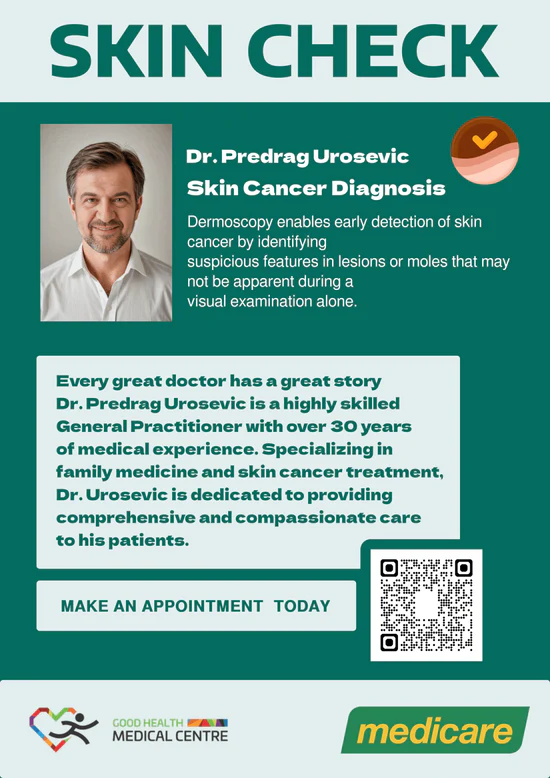What Are Benign Moles (Nevi)?
Benign nevi are pigmented skin lesions that can appear anywhere on the body. They may be present from birth (congenital) or develop over time (acquired). These moles are typically small (less than 10mm in diameter), round or oval in shape, and uniformly colored—from light brown to black. Most are flat or slightly raised and feel like normal skin when touched.
Though the majority of nevi are completely harmless, it’s important to observe them regularly. Changes in appearance, texture, or sensation may warrant a skin check, as they can sometimes indicate precancerous or malignant transformations.
Causes and Risk Factors
Benign nevi form when melanocytes—pigment-producing cells in the skin—grow in clusters. While the exact cause isn’t always known, several risk factors have been identified:
- Genetics: A family history of numerous or atypical moles may increase your risk of developing them.
- Sun Exposure: Ultraviolet (UV) radiation is one of the most common contributing factors. Sunburns, particularly during childhood, can increase the number of moles and raise skin cancer risk.
- Hormonal Changes: Nevi may appear or grow during periods of hormonal fluctuation, such as puberty or pregnancy.
- Immune or Skin Injuries: Infections, radiation exposure, or repeated trauma to the skin can also stimulate mole formation.
For more general guidance on mole safety and sun protection, visit the Cancer Council’s guide to moles and melanoma.
When to Monitor or Take Action
Most benign moles stay consistent in size, color, and shape. However, it’s vital to use the ABCDE rule to monitor for signs that might suggest a mole requires medical attention:
- A – Asymmetry: One half doesn’t match the other
- B – Border: Edges are irregular or blurred
- C – Colour: Varies across the lesion
- D – Diameter: Larger than 6mm
- E – Evolving: Changes over time in any way
In addition to visual changes, symptoms such as itching, bleeding, crusting, or sudden elevation should prompt an immediate skin check.
Importance of Regular Skin Checks
Routine skin checks are a proactive way to detect early signs of skin cancer, especially in regions like Queensland, where UV exposure is high year-round. Many skin cancers can resemble benign lesions at early stages, so a professional assessment using dermoscopy (a non-invasive magnifying tool) is the safest way to differentiate between benign and concerning skin formations.
At his Carindale practice, Dr. Predrag Urosevic uses advanced diagnostic techniques and his decades of clinical experience to evaluate and manage all skin concerns—from routine mole checks to biopsy and treatment of abnormal lesions.

Why Choose Skin Health Care in Carindale?
With over 30 years of medical experience, Dr. Urosevic offers compassionate and thorough skin cancer screening services. Whether you have a lifelong mole you want evaluated or you’ve recently noticed a new or changing lesion, booking a skin check is a crucial step in safeguarding your skin health.
Patients located in Brisbane’s south-east suburbs, including Carindale, Mt Gravatt, and surrounding areas, are encouraged to book a consultation. Dr. Urosevic’s clinic welcomes individuals seeking expert diagnosis, monitoring, and peace of mind.
If you’re looking for more information on skin cancer types and prevention strategies, you can explore resources provided by the Australian Government’s HealthDirect.
Book Your Skin Check Appointment in Carindale
Prioritize your skin health by scheduling a skin check with Dr. Urosevic at the Good Health Medical Centre in Carindale. Regular skin examinations are vital for early detection and effective management of skin conditions.
- Location: Good Health Medical Centre, Carindale, Brisbane, QLD, Australia
- Contact: (07) 3172 613
- Booking Options: Appointments can be made online or by phone. Walk-ins are also welcome.
Don’t wait—your skin health is important. Regular check-ups can provide peace of mind and ensure any concerns are addressed promptly.
Regular skin checks, sun-safe habits, and professional guidance
Benign nevi are typically nothing to worry about—but changes in their appearance or new growths should not be ignored. Regular skin checks, sun-safe habits, and professional guidance can make all the difference in early detection and effective treatment.
If you or a loved one has concerns about a mole or skin lesion, don’t delay. Make your skin health a priority with a trusted skin specialist.